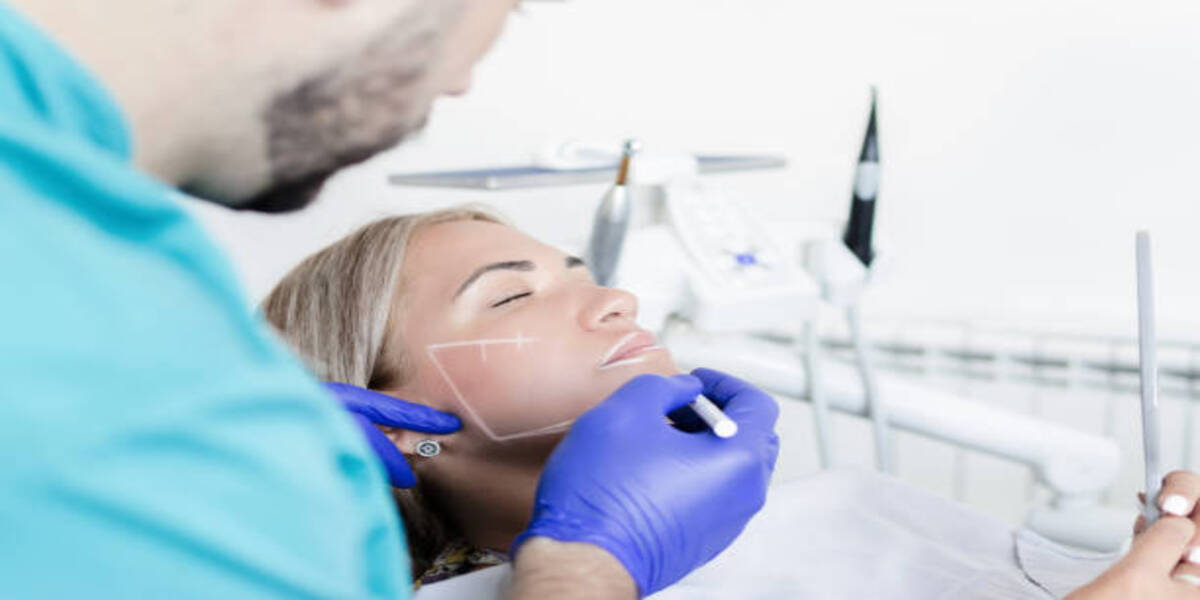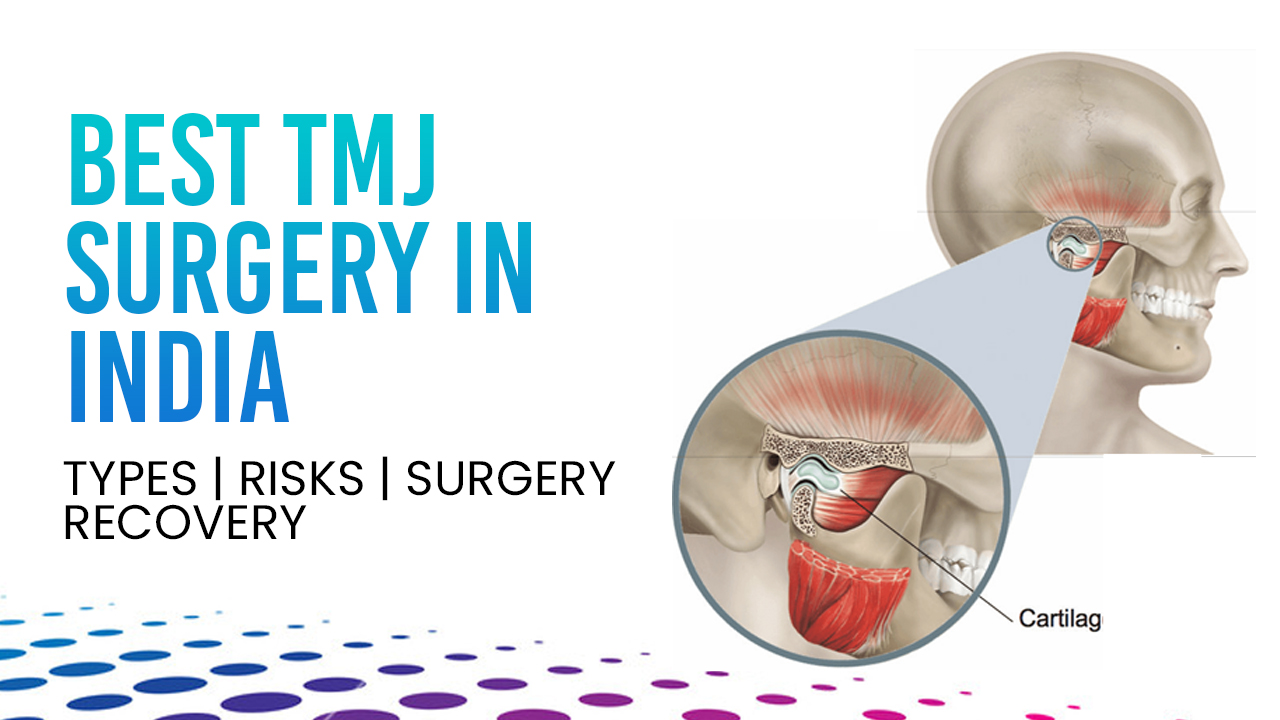Best TMJ Surgery In India- Types – Risks – Surgery – Recovery
Find effective TMJ surgery in India with Dr. Mathew PC. Discover relief from jaw pain and improve your quality of life with expert care.

The temporomandibular joint (TMJ) is a hinge-like junction where your jawbone and skull meet. The TMJ allows for the movement of your jaw up and down, allowing you to speak, chew, and perform various other activities with your mouth. TMJ surgery in India is one of the best options for TMJ disorder.
A TMJ disorder in India causes pain, stiffness, or limited mobility in your jaw, preventing you from fully using your jaw.
If more conservative therapies, such as oral splints or mouthguards, don’t help to alleviate your symptoms, surgery may be an option. TMJ Surgery in India may be required for some individuals to recover full use of their TMJ. The Temporomandibular Joint (TMJ) Disorder Procedure can relieve discomfort and enhance jaw function.
TMJ Disorders
The temporomandibular joint (TMJ) is a sliding hinge that connects your jawbone to your skull. Each side of your jaw has one joint. TMJ disorders, also known as TMD, can cause discomfort in the jaw joint and the muscles that control jaw movement.
The precise reason for a person’s TMJ problem is frequently difficult to pinpoint. Your agony might be the result of a variety of causes, such as genetics, arthritis, or jaw accident. Some persons who have jaw discomfort also clench or grind their teeth (bruxism), although many people who clench or grind their teeth on a daily basis do not develop TMJ problems.
The discomfort and agony linked with TMJ disorders are typically short-lived, and they can be alleviated by self-administered care or non-operative treatments in most situations. After several attempts at conservative therapy, surgery is usually the last resort for people suffering from TMJ problems, but some individuals may benefit from surgical procedures.
Who is a good candidate for TMJ surgery In India?
If your doctor thinks you may benefit from a dental implant, he or she may suggest TMJ surgery.
- When you open or close your mouth, you may experience aching or soreness.
- You just can’t open or shut your mouth completely.
- Because of jaw pain or immobility, you have difficulties eating or drinking.
- Even with rest or other non-surgical therapies, your discomfort or inactivity grows progressively worse.
- You have structural issues or diseases in your jaw joint that has been identified radiologically using an MRI, such as a broken jaw.
What are the different types of TMJ surgery In India?
Depending on your symptoms or their severity, a variety of TMJ surgical procedures are available.
Arthrocentesis
Arthrocentesis, a type of TMJ Surgery In India, is a procedure in which fluid is injected into your joint. The fluid washes out any inflammatory byproducts, allowing it to assist relieve the pressure that causes joints to be stiff or painful. This can help you regain some of your jaw’s range of motion.
This is a minimally invasive treatment. You are usually able to go home the same day. It takes little time to recover, and the success rate is excellent. According to a 2012 study published in trusted Source, arthrocentesis reduces pain by 80 per cent.
Arthrocentesis is generally the first-choice therapy since it is less invasive and has a high success rate when compared to other, more complex treatments.
Arthroscopy
Arthroscopy is another type of TMJ Surgery In India, is the technique of making a small incision or a few small incisions in the skin over the joint.
A cannula, a narrow tube with a tiny gap, is inserted through the hole and into the connection. Your surgeon will then insert an arthroscope into the cannula using this instrument. An arthroscope is a tool with a light and camera that can be used to look inside your joint.
When everything is in place, your surgeon may then operate on the joint using tiny surgical instruments that are inserted via the cannula.
Arthroscopic surgery is less invasive than open surgery, so recovery time is typically shorter, with a few days to a week being typical.
Open-joint TMJ Surgery In India
Open-joint surgery is the removal of a tiny incision over the joint so that your medical practitioner can operate on the condition of the joint itself.
This type of TMJ surgery in India is usually used only for people with a severe TMJ problem that necessitates surgery:
- The joint can’t move because there’s a lot of tissue or bone development that inhibits motion.
- Ankylosis is the permanent fusion of cartilage, bone, or joint tissue (ankylosis)
- A key drawback of arthroscopic surgery is the inability to reach a joint with arthroscopy.
Your surgeon will be able to remove bony growths or extra tissue by performing open-joint TMJ surgery in India. They can also repair or realign the disc if it is out of place or damaged.
A discectomy might be required if your disc is beyond repair. Your surgeon may replace your disc entirely with an artificial disc or your own tissue in this case. The surgeon may remove some of the diseased bone of the jaw joint or the skull when bony structures are involved.
The recovery time for open surgery is longer than that of arthroscopic surgery, but the success rate is still quite high.
Symptoms
TMJ problems are characterized by any or all of the following signs and symptoms:
- Your jaw may be painful or sensitive.
- Pain in one or both of the temporomandibular joints is called temporomandibular joint disorder (TMJD).
- You have a dull ache in and around your ear.
- Difficulty chewing or discomfort while chewing
- Facial pain that is aching
- The joint is hard to open or close since it has been locked.
When you open your mouth or chew, a clicking noise or grating sensation might occur as a result of TMJ disorders. If there is no pain or loss of function associated with your jaw clicking, you do not require treatment for a TMJ disorder in India.
Causes
The temporomandibular joint is a hinge-sliding mechanism. Cartilage covers the bones that interact in the junction and separates them with a small shock-absorbing disk, which tends to keep movement fluid.
If you have a painful TMJ disorder in India, it’s usually caused by one of these factors.
- The disk begins to erode or shift out of position.
- Arthritis destroys the cartilage in the joint.
- A blow or other impact to the joint causes harm.
However, the real cause of TMJ disorders in many cases is unknown.
Is it difficult to recover from a bad breakup?
The recovery from TMJ surgery in India is unique to each individual and depends on the type of surgery performed. Most TMJ operations are outpatient procedures, so you may leave the clinic immediately following the procedure.
Make sure someone is able to drive you home the day of the operation since you may be woozy or unable to focus, which are common symptoms of anaesthesia.
Take the day off from work before your surgery. If your job doesn’t require you to move your mouth much, you may take only one day of leave. However, if at all feasible, take a few days off to relax and recover.
After the operation, you might have a bandage on your jaw. To keep the wound dressing in place, your doctor may also wrap an additional bandage around your head.
Do the following for one to two days after surgery to ensure a speedy and successful recovery:
- if your doctor advises you to take nonsteroidal anti-inflammatory medications (NSAIDs), do so for any discomfort. (People with bleeding disorders or kidney difficulties should not take NSAIDs.)
- Choosing non-solid and crunchy meals is a good idea. These may cause joint discomfort. You may require a liquid diet for one week or more, as well as soft food for three weeks or more. Make sure you drink plenty of water after surgery.
- Place a cold compress on the afflicted area to assist with oedema. A frozen bag of vegetables wrapped in a clean towel is an easy compress.
- Warm heat placed on the jaw muscles might also assist with comfort after surgery, such as using heating pads or microwaving a damp cloth.
- Cover your bandage before bathing or showering to ensure that it is waterproof.
- Remove and replace bandages on a regular basis. Every time you change the bandage, apply any antibiotic creams or ointments advised by your doctor.
- Until your doctor permits you to remove it, wear a splint or other equipment on your jaw at all times.
After surgery, your healthcare professional will see you 2 to 3 days later to ensure that you are healing properly and to give any further instructions on maintaining your TMJ.
If your stitches do not dissolve on their own, your doctor may also need to remove them at this point. In addition, they may prescribe pain medication or any other infections that develop.
You may also require physical therapy to assist you to regain mobility in your jaw and prevent swelling from affecting your TMJ function.
Physical therapy sessions might take weeks or months, but if you work closely with your therapist, you should notice long-term benefits.
After the procedure, you may experience any of the following complications:
According to a 2014 study, Trusted Source, each sort of surgery is linked with a danger of complications. The following are some examples of the sorts of problems that might occur:
- The building was destroyed, exposing the steel frame.
- In addition, a number of germs and viruses can infect the skin.
- When the new siding is put on, it can be prone to bleeding cuts.
TMJ disorder in India is frequently not life-threatening and go away after a few months. The symptoms are usually modest, with the exception of numbness in one or both fingers.
However, TMJ problems can become serious and persistent in certain circumstances. When the disease makes it unpleasant to live, treatment must be sought as soon as possible to manage or cure the problem.
Whether the problem is minor or serious, professional assistance is always required to treat TMJ ailments.


